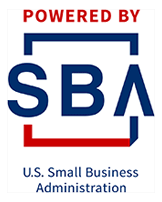Frequently Asked Questions
- How do I get a business loan?
- What are the basic skills you need to run a business?
- What kind of registration and licenses are generally required to start my business?
- Can you help me if my business is set up as a not-for-profit business?
- Do you have to be in business to use the services of the Small Business Development Center?
- What is it that you do?
- What are your hours of operation?
- Do you need a lawyer to start a business?
- What form of business do you recommend for a new business?
- Are there any "grants" available for my start-up business?
Q. How do I get a business
loan?
A. The kind of financing most entrepreneurs seek through commercial
lenders is debt financing. Most banks provide debt financing for
existing and start-up businesses. Banks vary substantially in their
lending practices. While one bank may decline your loan application,
another may be willing to take a higher risk or be interested in
lending to small businesses. It is advisable to understand a bank's
lending guidelines before applying for a loan. The general guidelines
that would enable a lending officer to at least make an informed
decision regarding your loan proposal are as follows: consideration
of the business idea, usually explained in a business plan, collateral
down payment (or equity in an ongoing business), credit history
and personal financial net worth, management ability, ability to
repay the debt, and conditions of the economy and/or market area.
Q. What are the basic
skills you need to run a business?
A. The basic survival skills include a working knowledge of recordkeeping;
financial management; personnel management; market analysis; breakeven
analysis; product or service knowledge; federal, state and local
tax knowledge; legal structures; and communication skills.
Q. What kind of registration
and licenses are generally required to start my business?
A. Obviously, there are specific requirements in each state, county
and locality, but it is possible to list the kinds of basic licenses
and registrations a new business will need: Local----A business
license from city, town or county, depending on your location, will
usually be necessary. In addition, you'll have to meet zoning laws,
building codes, and similar regulations. State----In most states,
if your business isn't a corporation and your full name isn't in
the name of the business, you'll have to register under what's called
the fictitious name law. You should also file for a sales and use
tax number. In some lines of business (like liquor stores, barber
shops, real estate offices) specific licenses are needed. Federal--You'll
need to contact the IRS for an employer's identification number
and a "Going Into Business Tax Kit."
Q. Can you help me
if my business is set up as a not-for-profit business?
A. Because of the SBDC's funding guidelines, the center is generally
not allowed to assist those businesses that are established as not-for-profit.
Q. Do you have to
be in business to use the services of the Small Business Development
Center?
A. No. You only have to be considering the idea of opening a business
or researching the feasibility of a proposed profit making venture.
Q. What does the SBDC
do?
A. The Small Business Development Center provides assistance and
training to help small business owners and potential owners make
sound decisions for the successful operation of their business.
Part of a statewide network, the SBDC serves twenty counties and
six cities in South-Central Virginia. The SBDC offers individual,
one-on-one, confidential counseling and sponsors workshops, conferences
and courses at various locations in its service area.
Q. What are your hours
of operation?
A. Small Business Development Center's normal hours of operation
are from 8:30 a.m. to 5:00 p.m., Monday - Friday. However, please
feel free to access our homepage and its resource applications 24
hours a day, seven days a week.
Q. Do you need a lawyer
to start a business?
A. No, but it's wise to get the best advice possible when you're
starting out. An attorney is one source of the expertise you'll
need to draw on. In some states you need an attorney to form a corporation;
however, you do not need an attorney to incorporate in Virginia.
We do highly recommend that you consult with an attorney and/or
a CPA to ensure the legal entity (S-Corp., C-Corp., LLC, etc.) is
the best one for your particular situation. In addition, there may
be several side-issues that should be spelled out in a legally binding
contract between the owners/stockholders. An attorney would ensure
that this documentation is properly prepared.
Q. What form of business
do you recommend for a new business?
A. Each form, sole proprietorship, partnership, or corporation,
has its advantages and disadvantages. The one you should pick depends
on your circumstances, including: your financial condition, the
line of business you're entering, the number of employees, the risk
involved, and your tax situation.
Q. Are there any "grants"
available for my start-up business?
A. Generally speaking, grants given to business start-ups are very
rare. An exception may be for a high-tech business or for businesses
producing products that can be used by certain agencies or departments
involved in our nation's defense.



